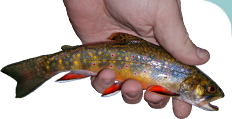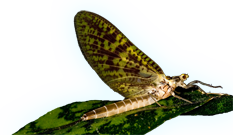Blog & Latest Updates
Fly Fishing Articles
Insects by Common Name


> > Emerging Isonychia nymph
| Troutnut | October 4th, 2006, 7:51 pm | |
Administrator Bellevue, WAPosts: 2737 | For those who didn't see the link in the "Recent updates" column, check out this neat photo sequence of an Isonychia bicolor nymph emerging on a rock in Esopus Creek in the Catskills. | |
| Jason Neuswanger, Ph.D. Troutnut and salmonid ecologist | ||
| GONZO | October 6th, 2006, 4:37 pm | |
Site Editor "Bear Swamp," PAPosts: 1681 | These are truly extraordinary shots, Jason! I'm struck by a couple of things: The crossveins and milky areas of the dun's wing really stand out. Did you play with the contrast, or is this enhancement-free? Your comment about the precarious position of the emerging dun brings up something I've never considered. I know you're probably more familiar with those suicidal Midwestern Isonychia that like to emerge in open water, but it's not unusual to see the Eastern variety lined up on nearly vertical rock faces. It does make me wonder, though, if they select emergence sites for the degree of grip they provide. Perhaps this is why one rock may have a dozen shucks while a nearby rock has none. Just an idle thought, but one I've never entertained until I saw this sequence. I wonder if stoneflies might do the same? I'm also reminded that I usually fished a dark, unstriped nymph imitation in the "old Esopus". On the Brodheads, many (but not all) of the Isonychia are distinctly striped. Did you notice any striped shucks on this day or were they all plain? | |
| Troutnut | October 7th, 2006, 8:56 pm | |
Administrator Bellevue, WAPosts: 2737 | The shucks I noticed on the Esopus and Schoharie that day were all plain. I've collected and photographed really heavily striped Isonychia nymphs on the Beaverkill. The early summer flies are, I think, a distinctly different breeding population from the fall ones, and I wouldn't be surprised if some rivers have both striped and unstriped Isos at different times. And half-striped. It's quite a variable trait. Interesting question about the selection of emergence rocks. I really noticed that on the Schoharie. If you check out the Isonychia page you'll see a couple streamside photos from there with lots of shucks on a few rocks in one spot, and there were relatively few elsewhere. It seems to me that they can be concentrated in very specific spots, but often they're on two or three close-together rocks rather than one particular rock. And lots of the unselected rocks seem to be of the same type. This makes me think they're responding to other location factors like current and sunlight instead. | |
| Jason Neuswanger, Ph.D. Troutnut and salmonid ecologist | ||
Quick Reply
You have to be logged in to post on the forum. It's this easy:
Related Discussions
| Title | Replies | Last Reply |
| Re: Isonychia parachute In the Insect Order Ephemeroptera by Deligon | 1 | Sep 9, 2008 by GONZO |
| Re: Lots of new pictures to check out, coming online tonight/tomorrow In General Discussion by Troutnut | 1 | Oct 4, 2006 by Dinerobyn |
| Re: caddis flies In Brachycentrus appalachia Caddisfly Adult by Flytyer0423 | 2 | Aug 11, 2009 by GONZO |
| Re: baetids, leaders, flies, and knots In General Discussion by Martinlf | 25 | Aug 10, 2007 by Martinlf |
| Re: Drift boat vs Raft preferences In General Discussion by Flyguide1 | 6 | Sep 14, 2018 by CaseyP |
| Re: Tinodes sp. (1 more) In the Photography Board by Millcreek | 3 | Feb 24, 2015 by PaulRoberts |
| Re: Best of the Forum - most interesting quotes list In General Discussion by Troutnut | 57 | Feb 1, 2016 by Martinlf |
| Re: confusing fish behavior In General Discussion by Wwelz | 2 | Jun 26, 2008 by Wwelz |
| Re: Possible Maccaffertium Terminatum Mayfly Spinner? In the Identify This! Board by Delvalle | 1 | Jul 11, 2008 by Taxon |
| Re: Mayfly I.D. In the Identify This! Board by MarkP | 4 | Aug 26, 2008 by Taxon |
Troutnut.com is copyright © 2004-2024 Jason
Neuswanger (email Jason). See my FAQ for information about use of my images.
 privacy policy
privacy policy

